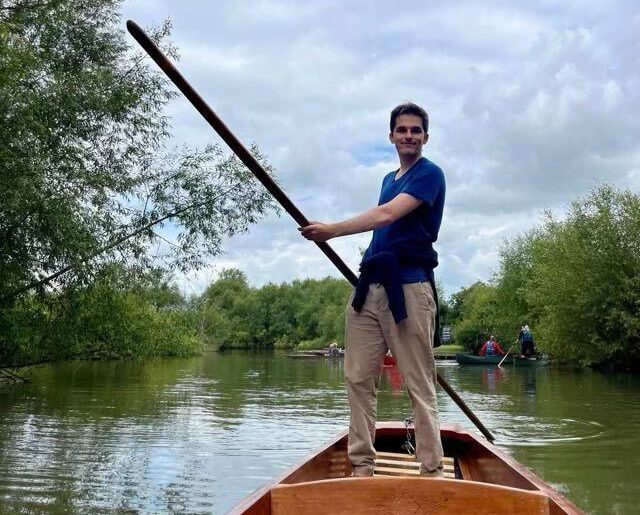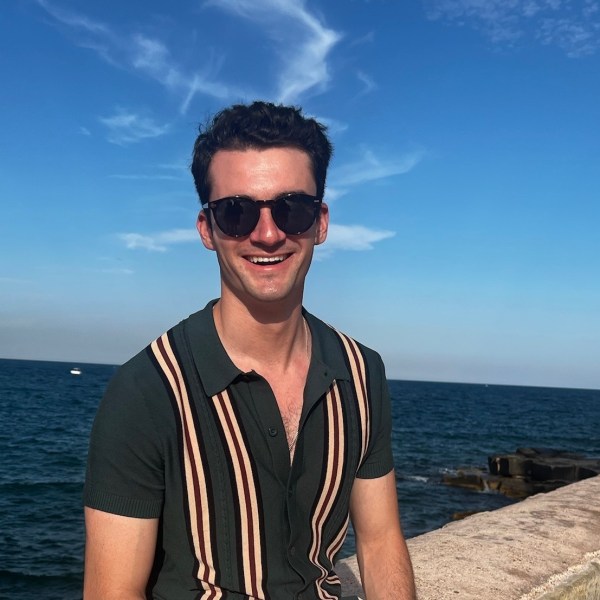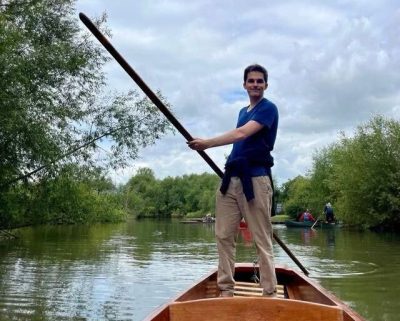Hey everyone, thanks for all of the great questions! In a job where you spend so much time typing words on the internet, it’s nice to be reminded that real people actually read—and even more surprisingly, enjoy—what you write! Let’s dive right in.

On Studying in England
Nicholas Knopf asks: Which, if any, elements of the English university system would you import to American universities, particularly in response to recent questions regarding the politicization of curriculum, hiring practices, and administrative procedures? Conversely, which aspects of the American university system could benefit the English university system?
This is a complicated question, as English (and Welsh and Northern Irish) universities are run very differently than the Scottish schools (which are four years, rather than three, and more amenable to the liberal arts). On top of that, Oxford—where I studied abroad, had to leave early due to the pandemic, and later returned to get a master's in military history—is fairly unique among the English system: Only Cambridge and Durham (to an extent) share its “tutorial” system, in which undergraduates (and some graduate students) learn through extremely optional lectures, weekly papers, and 90-minute meetings with a faculty member where they’re grilled on what they wrote. And there are no grades at all until your final exams. (Fainting is not uncommon.)
So, I can only really speak to that small slice of British academe … but there’s a lot American universities could learn! The first is that, especially at the elite level, British students have a lot more independence. Remedial classes, as far as I could tell, did not exist at Oxford. There’s a general sense that students are not there to have their hands held—in part because the universities have less money, so there are fewer administrators. (The drinking age being 18 also means there is less need to police students.) This led to a much more vibrant student life if you were willing to be social.
In terms of politicization, there is less of that in Britain, although academics are still generally left-wing. (My own personal view is that American conservatives who complain about this problem would most easily fix it by going into academia themselves.) There’s also the fact that there simply are more Tories present at Oxford than, say, Republicans at Yale, even if they’re still a minority. That’s because the Conservatives are still welcoming to upwardly mobile, ambitious, and educated non-radicals and moderates; increasingly not true in the U.S. Many of my peers, even at Swarthmore, would be quite at home as Eisenhower/Bush Republicans, if there was any sense that today’s GOP would still tolerate them.
Speaking specifically to my studies, I found academics in Britain are generally expected to publish historical works aimed at what I’d call a “high middlebrow” audience. I don’t believe the primary job of an academic is to publish “popular” history—writing isn’t necessarily his or her primary skill—but rather in-depth research that a journalist or hobby scholar could not produce. That said, I also think American historical academia has leaned too hard into producing only scholarly monographs that a handful of people will read. This has led to a self-defeating cycle whereby the broader public has less access to, and therefore more disdain for, the academic humanities.
There are plenty of benefits to the American system, though. For starters, we treat our academics much better—which is, to be clear, a very low bar! British academics generally have tenuous job security, more student debt, and much lower salaries, especially in the humanities. American universities seem to be cutting everything that’s not engineering, computer science, or undergraduate business—and converting almost half of the professors to year-to-year adjuncts—but our tenure track and funded PhD programs are still a major advantage.
More importantly, as the proud graduate of a liberal arts college, I was really struck by how much friendlier American schools are to the liberal arts. Due in part to the legacy of public schools like Eton, British universities simply don’t have any expectation that students will be well-rounded; instead, they push them to focus narrowly on one subject. I think that’s getting education exactly backward. Although I was a history major, I was rewarded enormously by taking classes in biology, Shakespeare, music, and even calculus (loath as I am to admit that).
Svetland Bekman asks: What College at Oxford? I got a History MPhil at Hertford in the late 1990s. Did you try rowing? Did you acquire a taste for something very British? I acquired a taste for beer (alas) and I still love/buy Pimm’s decades after my experience.
I got my master’s at Wolfson College, Oxford, which was founded by the philosopher Isaiah Berlin in the 1960s. It’s not the typical Oxford feel: brutalist architecture, an “egalitarian” lack of a high table in the hall, heavily international. I loved it. Coming from a Quaker college, I could appreciate the gentle disdain toward the intense formality and traditionalism in much of academia.
I am not a huge fan of British beer, as it mostly consists of lukewarm ales, and the Brits are strangely impervious to our craft beer craze. But I basically only drink Guinness now, when I’m drinking. And yes, Pimm’s is the best summer drink on earth! My favorite strange British snack is probably digestive biscuits. I could never bring myself to like the breakfast, though!
Richard Kennedy asks: Is there a different, maybe significantly different approach to American history among British historians as opposed to Americans that you have observed?
The only major difference I’ve noticed is that British historians are significantly less polite. In the United States, the most stinging criticism you’ll get from a reviewer is that “these lines of inquiry could have been better pursued.” In Britain, academics are much more sharp-elbowed and much more likely to flatly tell you that your thesis is incorrect.
James D: What’s your favorite historical period/periods to study?
Well, both my undergraduate and graduate theses were on 18th-century Britain and its confrontation with Napoleon, so I certainly find that period very interesting. I also had a particular interest in the histories of nationalism and militarism, and how they interact with changing ideas of who is and is not a citizen in a liberal democracy. But to be honest, the answer is all of them! This is why I enjoy being a journalist—I get to learn about a lot of different subjects.
On Teaching
Hemingwayrk asks: When teaching, did you find the majority of your students to be unprepared, or adequately prepared in their knowledge of history upon entering your class?
As with anything, there was a wide range of knowledge among my students. I always viewed my role as trying to inspire an appreciation for learning about the past and the wider world, rather than making sure everyone had the key battles of World War I down pat (because let’s face it, everyone forgets most of the specifics they learn in high school). On that point, one of my biggest takeaways from teaching was the realization that many of our culture war debates about education are ludicrously overblown. I remember that the same day I read a New York Times article about the fine points of the causes of the Civil War and how they were taught, I was desperately trying to make sure that my class of (bright and hardworking) students remembered that Grant was a Union general, and Lee was a Confederate!
H.W. asks: Hi, James. How do you market The Dispatch to your friends who do not share its conservative principles? Do you have any examples of your friends being persuaded by The Dispatch?
At this point, mostly passive aggression. Early on, my close family and friends were very excited to hear I’d be a reporter in D.C. and quickly subscribed. But now that the “easy targets” are all members, whenever friends ask me how work is going, I just answer, “You’d know if you were a subscriber!”
I’m not sure if anyone I know has been “persuaded” by The Dispatch per se, but I’ve certainly heard from a lot of quite liberal people that they really appreciate getting a reasonable, clearheaded argument for the other point of view.
Jeffrey B.: Great to see a fellow Lowellite contributing to the conservative conversation!! I grew up in the rare Republican household in SF in the ’80s and ’90s, so my political leanings always seemed to go against the general tide. Just wanted to know a little about your upbringing and if your political leanings always skewed to the conservative side of things?
Go Lowell! I’m a very proud alum, and I recommend watching the recent documentary about the school by Debbie Lum, Try Harder!” (See if you can catch me in a few frames, too!)
Well, my upbringing was a bit like yours. One of my parents was a Republican and one was a Democrat, so I always had a more critical perspective on the city’s politics than most. I also really appreciate how seriously my parents took the idea that I should form my own political opinions: They wouldn’t tell me how they voted in elections until I was a teenager, and they made a point of not trying to tell me what to think about politics. I’ve never had what I think is a common American experience of being shocked and dismayed by learning that someone you care about disagrees with you. I had no other option! I was also raised by lawyers and debaters, so I think I developed a thicker skin than most. A lot of people are just too damn sensitive about politics.
Michael.Keffer asks: You taught my daughter during your stint teaching “high school history in suburban Philadelphia.” (Great job, by the way!) What was your reaction to that experience? Any big takeaways about the next generation, private vs. public schooling, etc.?
I loved working as a teacher, in large part because of my amazing coworkers and wonderful students. The school where I taught was truly a special space, with a strong community and really good values: service, relationships, and tradition.
My only advice for the next generation is that phones need to be out of school—yesterday. I understand that a lot of parents want to be able to contact their children during the day, but phones should, at the very least, be in a cubby at the front of the classroom during class. If a teacher is competing with a phone for attention, the phone is going to win 75 percent of the time. I should know, I spent most of my junior year in AP Government reading Politico! Although I think they can be useful learning tools, the same generally applies to laptops and iPads, which are now ubiquitous. Every parent should read this article about the school in Delaware that banned phones.
Also, as a public school kid who taught in a private high school, I can see there are clear advantages and disadvantages to both. High-pressure schools, both public and private, where students are overworked, overscheduled, and obsessed about college can be terrible for mental health, but students can also learn a lot more! Public schools tend to have more extracurricular activities—drama clubs, football teams, debate squads, etc.—but students at private schools generally have tighter-knit communities and closer relationships with teachers. It’s a trade-off, even setting aside the money, and it depends on the student and his or her needs.
On Museums
LisaM asks: England does a fantastic job with niche museums. What are some great ones you’ve visited?
Given my background in military history, I enjoyed visiting the Army regimental museums: small museums set up by veterans’ associations of specific regiments, which often have centuries-long histories and traditions. My favorite was the Rifleman’s Museum in Winchester, which features exhibits on the cutting edge of Napoleonic tactics and technology.
Adam.Zerda: I love museums but the family does not. What is your best strategy to get family or friends who don’t quite share your passion to, at least on occasion, participate with you on a museum visit?
This is a tough one. My interest came primarily from exposure. Some of my earliest memories involve being dragged to San Francisco MoMA after church, where I had to suffer through Warhol and the like as a 6-year-old boy in a blue blazer. I’m grateful for the experience now, though, because art museums, like classical music or great literature, take time and effort to learn to appreciate. I’m glad my mom was enough of a snob to know that when I complained about Rothko or Kiefer, the problem was with me, not the art.
Fhsutton asks: Which city (besides New York) has the best museums in the country? Favorite museum in D.C., San Francisco, and Philadelphia?
The obvious answer to the first question is Los Angeles: the Getty, Getty Villa, Huntington, Broad, and LACMA are all world-class. To the second: My favorite D.C. museum thus far has been the National Gallery of Art, the de Young in San Francisco is an incredible work of architecture, and the Barnes in Philadelphia is truly a unique treasure. But the National Museum of American Jewish History, also in Philadelphia, is criminally underrated. I generally don’t like historical museums, but this one is so well laid out, informative, and creative in its presentation that it’s become one of my favorite museums anywhere. You’d learn more “straight” American history there than in the Smithsonian National Museum of American History, arguably the Smithsonian’s worst. Plus, it’s free!





Please note that we at The Dispatch hold ourselves, our work, and our commenters to a higher standard than other places on the internet. We welcome comments that foster genuine debate or discussion—including comments critical of us or our work—but responses that include ad hominem attacks on fellow Dispatch members or are intended to stoke fear and anger may be moderated.
With your membership, you only have the ability to comment on The Morning Dispatch articles. Consider upgrading to join the conversation everywhere.